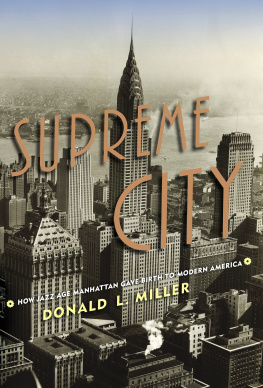The author and publisher have provided this e-book to you for your personal use only. You may not make this e-book publicly available in any way. Copyright infringement is against the law. If you believe the copy of this e-book you are reading infringes on the authors copyright, please notify the publisher at: us.macmillanusa.com/piracy.
On January 29, 1894, a depression formed east of the southern Atlantic coast, moved inland over the Chesapeake Bay, and traveled northward, where it collided with another area of low pressure coming from the west and exploded into one of the most severe coastal storms the region had seen in years. A fierce gale and snow pounded the eastern seaboard into the next day, whipping Atlantic City with winds that reached sixty miles an hour, and wrecking the schooner Aberdeen off the coast of Gloucester, Massachusetts. As the tempest gathered strength, a young woman hurriedly made her way from Boston down its path, as if the swirling storm were itself drawing her southward. By the time she reached New York, the full force of the blizzard had descended on Boston, burying it under snow. She took a ferry across the Hudson River to the Pennsylvania Railroad Station in Jersey City, dashed off a letter to her sister as she sat in the ladies waiting room, and then boarded the Baltimore & Potomac Railroads midnight express to Washington. She crossed paths with the storms original landfall near Havre de Grace, Maryland, early on the morning of the thirtieth, just as the oystermen and the market duck hunters with their Chesapeake Bay retrievers would have been setting out to provision the restaurants and markets of Baltimore and Washington with those mainstays of the nineteenth-century diet.
For Jane TuckerJennie to her fractious family and her friendsthe rushed journey southward was a desperate gamble to break free from the rut of low-paying jobs and lecherous bosses that had come to define her life as part of the first generation of women to foray into the formerly forbiddenand largely malerealm of office work. Still single and nearing thirty, like many young women of the time she realized she likely would need to take care of herself, but she had struggled to find financial and professional security. The opportunity in Washington was coming just as she felt the bottom had dropped out of everything, as she told her mother. Her sister Patty, a successful journalist, had died the previous November, just months after being diagnosed with uterine cancer. Her aging parents had taken it hard, and her father in particular seemed feeble and [grew] childish, deepening Jennies guilt about leaving them alone in the family home in Maine. Then, just before Christmas, Jennie had lost her job as a secretary at the West End Street Railway in Boston, making her another casualty of the financial depression that had wracked the country since the previous winter. Adding to that, she had developed an excruciating toothache, the result of a badly abscessed tooth that had been treated three times but had so far resisted the ministrations of nineteenth-century dentistry.
Jennie had found herself questioning what her life as a working woman was adding up to, with a string of insecure jobs, paychecks that never seemed to stretch to the end of the month, and moves from one lonely boardinghouse to another. Im so tired of living alone, she wrote to her sister Maude. I have not gained much by being independent in the past. Its brought more heartache than anything else. She confessed she felt so despondent that she tried to make up my mind to kill myself only I didnt have the courage.
Jennie had returned home to take stock. I think the shock to my nerves from all the trouble since Pattys death has kind of broken me up, she told her mother. When she arrived at Castle Tucker, which is what the locals called her familys turreted mansion on the Sheepscot River, her mother was shaken by the terrible condition her normally hale daughter was in, the trouble with her tooth compounded by bleeding piles from the arduous train journey north.
All Jennie wanted was to spend a quiet winter at home, but her respite was short-lived. Two days after she arrived, on January 17, she received a telegram from one of her old bosses, Charles Stollthe only one she liked and the only one who had treated her as more than a stenography-taking drudge. He asked if she was available immediately for a two-month engagement in Washington, but didnt say what the nature of the work was. As much as she wanted to work for him again, Jennie hesitated. Physically and mentally, she felt depleted. And her mother needed her to get Castle Tucker ready for the paying summer guests who came to enjoy the Maine coast, the family fortune having gone the way of the cotton markets that built it. There was also the matter of money; Jennie was flat broke and her clothes were so shabby that she had spent much of her free time the previous fall mending and reworking her old duds to maintain some semblance of fashionable dress.
Why, she must have wondered, would Stoll need her to come all the way to Washington to do secretarial work when the capital, like the rest of the country, was awash in unemployed stenographers and typists?
When she raised her concerns with Stoll, he dashed off a quick letter dismissing them. Why you, of all persons, are the last to let a little sickness effect your spirits Of course you have not made moneywho has? Why for six months I was scared to death, he wrote. And then he said she could name her price if she agreed to come. That settled it. Jennie cabled back that she would come for fifteen dollars a week, the most she had ever made, plus her travel expenses. Stoll cabled back a quick acceptance of her terms, plus fifty dollars for expenses, and told her to go to Boston and await further instructions. The rest of the week was a rush of preparations. Not wanting to spend too much money on the new dress she desperately needed, Jennie took apart one of her sisters old wrappersa loose-fitting, high-necked house gown that Victorian women wore belted like a robedyed it twice to get the color she wanted, and made what her mother called a pretty, tasteful dress. She packed and made arrangements to return temporarily to the Beacon Hill boardinghouse where she had been living.
When Jennie arrived in Boston on Saturday morning, January 27, a thick letter from Stoll was already waiting for her. When she read it and comprehended what he wanted her to do, she shuddered. My surprise and the feelings which first crept over me cannot be described, she wrote him back. He had explained that what he wanted her to do was in the line of detective work and required someone thoroughly acquainted with human nature and able to devise and execute plans. He detailed exactly what the job entailed and how to make arrangements to come to Washington. The mission filled Jennie with trepidation, but she didnt want to disappoint Stoll. Swallowing her doubts, she cabled, I leave for Washington Monday.



















